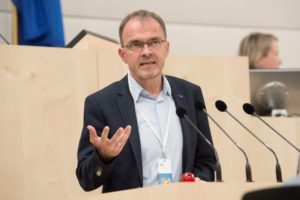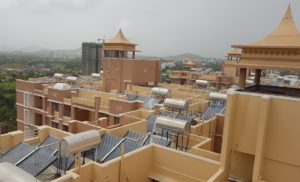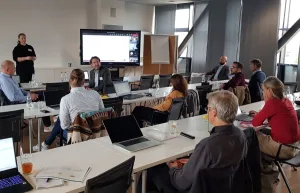

Portugal: Market Players facing Serious Problems
Two months after the new government came to power, its strategy for solar energy still remains a mystery: The new subsidy programme barely mentions renewable energies, but focuses on energy efficiency instead. Last year’s two subsidy schemes for Small and Medium Enterprises (SMEs), as well as Private Social Solidarity Institutions (IPSS) and sports facilities have also stopped. And, the tax rebates of roughly EUR 800 for residential clients who purchase renewable energies equipment have no longer been in place since an agreement of the government with the International Monetary Fund (IMF). At present, buyers of solar water heaters can only declare a limited amount as a tax benefit, which means a much smaller savings effect.
In light of these news, the market is beginning to restructure and companies are adapting their portfolio, preferring other technologies, such as photovoltaics and heat pumps. Many businesses also face serious financial problems, as they are still waiting for the money that should have been paid out by the 2009 residential subsidy scheme Medida Solar Térmico (MST). In some cases, the delay has already been eight months. The company responsible for managing the scheme, Yunit, is now acting as a creditor and pays the subsidies promised by the government in advance – but with high interest rates the solar thermal system suppliers alone must bear.
According to the national solar association Apisolar, this stop-and-go policy endangers the market’s prospects: “The public is expecting new incentive measures, delaying the purchase of solar water heaters, while companies that made strong investments in order to meet previous demand find themselves in an uncertain and economically difficult situation,” Apisolar states. The collapse of demand also resulted in a drop in system prices, which some clients understand as a “new incentive measure”, according to the association.
Apisolar has advised the new government to continue supporting solar thermal, to allow the existing one million single family houses to feel motivated enough to buy and install solar thermal systems, in order to improve both their own comfort and overall energy efficiency. In Apisolar’s view, a direct investment subsidy, in which the client chooses the supplier according to market rules and pays directly to it, is considered the best possible solution to the current crisis. After choosing the supplier, a client should be able to go to a public or private institution, such as a post office or bank, at which he would receive the equivalent of the actual tax rebate (EUR 803) that was available until the end of 2010. If the government does not adopt this kind of investment subsidy, the association has recommended to at least restart the tax incentives which were in place until the end of 2010 and to not increase the VAT for renewable energy equipment. Apisolar also thinks that awareness for the comfort and economical benefits of solar thermal would best be raised by an intensive advertising and communication campaign initiated by the government.
On the heating front, solar thermal is now facing a new competitor: heat pumps. Companies are looking to heat pumps as a way to offer a more diverse portfolio. Apisolar emphasises that – in comparison to heat pumps – solar thermal had “clearly” more advantages with regard to hot water production and that the two technologies were, in fact, complementary. “If we analyse it from an economical perspective, the huge investment differential (3 or 4 times more in case of heat pumps), we can clearly see that the technologies are not competitors, but complement each other,” the association explains.
Moreover, Apisolar places much importance on qualification and professionalism in the sector. “The potential of our sunny country can no longer be ignored by our government. Combined support is necessary to achieve the European targets,” Apisolar states. The association is ready to cooperate in training and qualification measures, as well as communication and marketing initiatives which official or private entities may propose. “We are already working together with the ministries and agencies to find ways of growing the solar thermal market – because the sun rises for all,” Apisolar announces.
According to the national energy agency, ADENE, Portugal was able to save EUR 350 million (equal to saving 4.9 million barrels of oil) on its 2010 energy bill, thanks to the measures stipulated in the Energy Efficiency National Action Plan (PNAEE). Solar thermal, which is part of the PNAEE, surpassed its 2010 target on the plan by 44 %, reaching a total of 750,000 m2 of installed collector area at the end of last year.
More information:
http://www.apisolar.pt/


